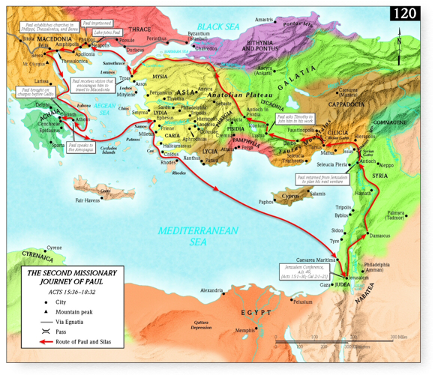Acts 16:1-10

Today's Passage: Acts 16:1-10

*Holman Bible Atlas, 246
At the end of Acts 15, Paul set out on his second missionary journey with Silas shown in the map above. In Lystra, Paul conscripted another young man named Timothy. Timothy was born to a Jewish mother and Greek father and would eventually lead the church at Ephesus. The other believers regarded Timothy highly. He was a perfect candidate to join Paul in ministry.
Verse 3 says “Paul wanted [Timothy] to go with him; and he took and circumcised him because of the Jews who were in those parts.” Wait just a second, didn’t we just read in Acts 15, that this wasn’t necessary for non-Jewish believers? Here we see an incredible (and sacrificial) leadership principle. Timothy didn’t get circumcised for salvific purposes, he was circumcised to break a barrier to the gospel.
The Jews of the region simply wouldn’t listen to Timothy (or Paul for that matter) if he wasn’t perceived as a Jewish convert. Timothy participated in the minor, yet sensitive, procedure because he wanted to see people come to Christ. He could have refused, but he would have lost his opportunity.
In verse 6, we see an odd turn of events, the Holy Spirit stopped Paul and his compatriots from going into Asia. Two points: (1) “Asia”; in the NT this always refers to the Roman province of Asia, made up of about one-third of the west and southwest end of modern Asia Minor. This does not refer to the continent of Asia (NET Study Notes). (2) How these hindrances were accomplished is not stated. It may have been circumstances, a word of prophecy, a vision, or some other phenomenon. At any rate, God planned for people in both Ephesus and Bithynia to hear the gospel at a later time (cf. 18:19–21, 24–19:41; 1 Peter 1:1). (Bible Knowledge Commentary)
On a side note, in verse 10, notice the pronoun “we” enters the mix. It seems, at this point in Paul’s journeys, Dr. Luke joins the expedition and records their experiences first hand.
Today’s passage covers a lot of time and distance. Yet, two huge things happen—Timothy is added and the province of Asia is excluded so they could hurry to Macedonia. One main theme jumps out, leaders do whatever is necessary to reap the most fruit. Timothy agreed to circumcision so he could witness to the Jews. Paul and the team skipped Asia and went quickly to those God had prepared in Macedonia. Both instances were fruit-based decisions. They did what was necessary to see lives transformed for Christ.
Written By: Tyler Short
At the end of Acts 15, Paul set out on his second missionary journey with Silas shown in the map above. In Lystra, Paul conscripted another young man named Timothy. Timothy was born to a Jewish mother and Greek father and would eventually lead the church at Ephesus. The other believers regarded Timothy highly. He was a perfect candidate to join Paul in ministry.
Verse 3 says “Paul wanted [Timothy] to go with him; and he took and circumcised him because of the Jews who were in those parts.” Wait just a second, didn’t we just read in Acts 15, that this wasn’t necessary for non-Jewish believers? Here we see an incredible (and sacrificial) leadership principle. Timothy didn’t get circumcised for salvific purposes, he was circumcised to break a barrier to the gospel.
The Jews of the region simply wouldn’t listen to Timothy (or Paul for that matter) if he wasn’t perceived as a Jewish convert. Timothy participated in the minor, yet sensitive, procedure because he wanted to see people come to Christ. He could have refused, but he would have lost his opportunity.
In verse 6, we see an odd turn of events, the Holy Spirit stopped Paul and his compatriots from going into Asia. Two points: (1) “Asia”; in the NT this always refers to the Roman province of Asia, made up of about one-third of the west and southwest end of modern Asia Minor. This does not refer to the continent of Asia (NET Study Notes). (2) How these hindrances were accomplished is not stated. It may have been circumstances, a word of prophecy, a vision, or some other phenomenon. At any rate, God planned for people in both Ephesus and Bithynia to hear the gospel at a later time (cf. 18:19–21, 24–19:41; 1 Peter 1:1). (Bible Knowledge Commentary)
On a side note, in verse 10, notice the pronoun “we” enters the mix. It seems, at this point in Paul’s journeys, Dr. Luke joins the expedition and records their experiences first hand.
Today’s passage covers a lot of time and distance. Yet, two huge things happen—Timothy is added and the province of Asia is excluded so they could hurry to Macedonia. One main theme jumps out, leaders do whatever is necessary to reap the most fruit. Timothy agreed to circumcision so he could witness to the Jews. Paul and the team skipped Asia and went quickly to those God had prepared in Macedonia. Both instances were fruit-based decisions. They did what was necessary to see lives transformed for Christ.
Questions for reflection:
Is there anything in your life that hinders your witness, even if not inherently bad?
How often do you consider your daily decisions with regard to the fruit it could produce?
What would happen if you did? What would need to change?
Written By: Tyler Short


No Comments